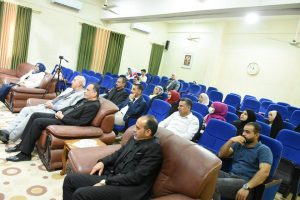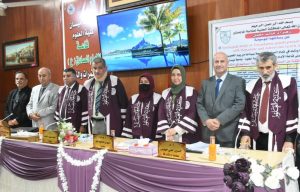A master’s thesis was discussed in the College of Science/Department of Biolog, submitted by student Zahraa Khaled Mijbil entitled: – Serological study of the relationship between toxoplasmosis and neurotransmitters, dopamine and adrenaline. The study aims to:
1- Estimation of the prevalence and severity of Toxoplasma parasite infestation using the ELISA test in the city of Al-Amara.
2- Studying the relationship between toxoplasmosis and the level of some neurotransmitters such as dopamine and adrenaline.
3- Studying the effect of toxoplasmosis on the blood picture using CBC tests.
4- Studying the role of some socio-demographic factors in the infection of toxoplasmosis.
By conducting immunological tests using the ELISA method for IgM and IgG antibodies for a sample of 174 people from the city of Al-Amara, the infection rate was 52.3%, and the percentage of females was higher than males. A decrease in haemoglobin levels, the number of red blood cells, white blood cells, platelets and other blood components. The study also showed a high rate of infection in the blood of donors who do not undergo the Toxoplasma examination at all, which was not originally among the safety tests of the transfused blood, as well as surgeries. The acquisition of cats and contact with them are important factors in acquiring the infection. While it was noted that the cultural and educational level, income and nutritional behavior such as eating dairy are not pasteurized, and eating meat from popular stores and unhealthy slaughterhouses related to infection. The results of the study also showed a significant relationship between infection with toxoplasmosis and delayed pregnancy and miscarriages or the birth of children with congenital defects, as well as with menstrual disorders in women. and other factors.
The study concluded that:
1- The city of Al-Amara is considered as one of the areas infested with Toxoplasma parasite, with a high rate of 52.3%.
2- The infection is still circulating among the city community through the newly registered infections, which are close to 50% of the infections.
3- Females are more susceptible to infection, and this is due to their body physical, in addition to doing work that brings them closer to the center of the risk of infection transmission, such as cleaning the house and cutting meat.
4- The blood bank plays a major role in transmitting infection from donors to recipients, as it lacks safety checks for toxoplasmosis.
5- The infection affects some components of the blood.
6- The parasite’s association with some neurological and behavioral disorders in some infected cases.
7- The parasite plays a role in abortions, delayed pregnancy and the birth of deformed fetuses.
The study recommends:
1- Health authorities should recommend to include the toxoplasmosis test on the list of tests that must be performed before donating blood.
2- A deeper cross-sectional study that includes thousands of people with a comprehensive examination of host animals and cats to determine transmission factors.
3- Conducting a field study by the Ministry of Higher Education, Health, Environment, and Justice, to know the role of the parasite in causing some nervous disorders, crime and road accidents.
The discussion committee consisted of:-
- Prof. Dr. Ahmed Aboud Khalifa, University of Misan, President.
- Prof. Dr. Ahmed Khudair Issa, University of Babylon, Member.
- Assoc. Prof. Dr. Aswan Kadhim Jabber, University of Misan, Member
- Prof. Dr. Hussein Ali Mahos, University of Misan, member and supervisor.
On this occasion, the Dean of the College, Dr. Sabeh Jassim Kateaa met the members of the Discussion Committee in his office to appreciate their efforts with a letter of thanks and appreciation.

